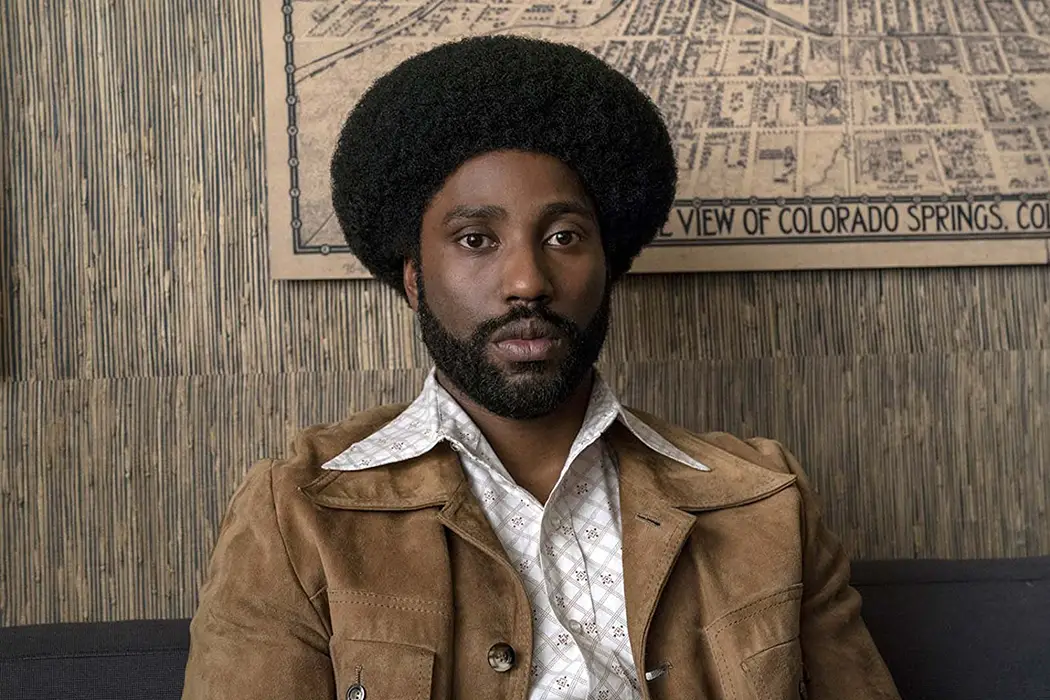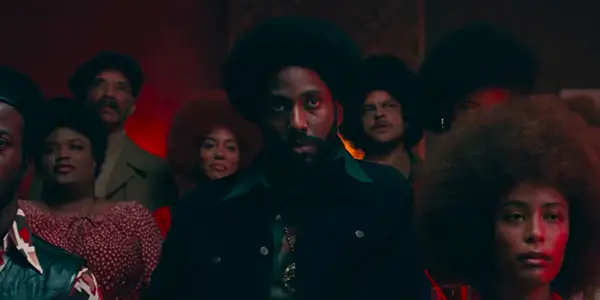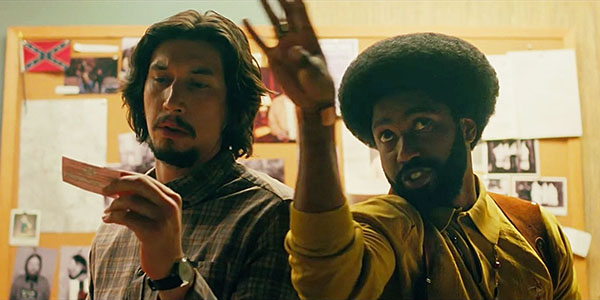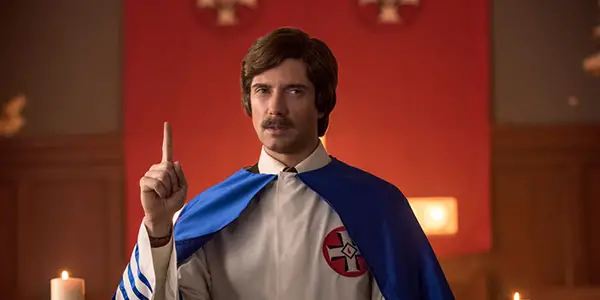BLACKkKLANSMAN: The Power Of Cinema Triumphs Over Racism In Spike Lee’s Best Film In Decades

Christine is a software engineer currently working in the animation…
An opening title card states that director Spike Lee’s BlacKkKlansman is “Based upon some fo’ real, fo’ real sh*t”. This is true not just in the sense that the film tells the true story of a black cop who infiltrated the Ku Klux Klan in the 1970s, but also in the sense that all of the events depicted could be transmuted to 2018 with no loss of plausibility. Even when he’s working in a period setting, Lee is the master of the present moment – at their best, his films embody an urgency that reflects what’s actually going on at the time of their making.
Time and again, Lee has served as America’s cinematic conscience on racism, beginning as an upstart independent filmmaker with his 1989 breakout Do The Right Thing. Today, Lee is both a guiding moral voice and an elder statesman of the film industry. In a year shell-shocked by a surreal resurgence of public racial hatred, no other working director could have tackled the subject matter of Blackkklansman with the same level of skill and authority.
Focused, Funny, and Thrilling
By many measures, the film represents a return to form for Lee. While 2015’s indictment of Chicago gun violence Chi-raq was brilliant in concept, stylish, and bursting with exuberant justice, it was uneven in terms of execution. By contrast, BlacKkKlansman is laser-focused, with not a second of screen time wasted as it depicts white supremacy in America in scorching specificity. Despite the gravity of the subject matter, it’s also a hell of a lot of fun, and a nail-biting police thriller to boot.

Ron Stallworth (John David Washington) is a black rookie officer of the Colorado Springs Police who has been promoted from the filing room to the undercover unit. He’s initially tasked with gauging the “radical” sentiments of the attendees at a lecture by black liberation leader Kwame Ture (Corey Hawkins), during which he forms a relationship with Patrice (Laura Harrier), the head of the local college’s Black Student Union. After the investigation, he’s relegated to pushing pencils in the intelligence office.
While bored at his desk, Ron calls the local chapter of the KKK and convinces the racist leaders that he’s interested in joining. Realizing that he can’t continue the infiltration in person, he teams up with Flip Zimmerman (Adam Driver), who poses as “Ron Stallworth” in person while the real Ron continues to correspond with the racists over the phone. Both men must walk a fine line to conceal their true identities – Ron that he’s black, Flip that he’s Jewish, all while attempting to thwart the KKK’s insidious plans. If Lee is a master of tension, this is his masterpiece.
Smart casting makes the already entertaining premise even more fun. John David Washington got the acting gene from his dad – his quiet charisma and coolness under almost unbearable pressure make him a hero impossible not to root for as Ron. Alongside him, Adam Driver brings instant likableness and comedic chops to the buddy cop duo as he deadpans his way through pretending to be a raging bigot. Topher Grace is an inspired choice as KKK “Grandwizard” David Duke – his dweeby averageness serves to prove that evil can come in mundane and benign-seeming packages.

One of Blackklansman’s strengths is its incisive, true to life look at the inner workings of the white supremacist movement that Ron and Flip confront. It shows how the KKK was sanitized and marketed to Americans under the guise of “heritage” and “patriotism”. To great comic effect, it demonstrates the sheer banality of the movement – Flip plays along as the Klan’s clueless adherents gear up for a war of their own invention like ten year old boys playing army in their backyard. Completely segregated from the people that they consider their enemy, their hatred is based on abstractions, myths, and a delusional superiority complex.
While the behavior may be laughable, Lee pulls no punches about the threat that the KKK presents. In one particularly tense sequence, we hear a white supremacist radio commentator expounding on “Western Civilization” and the unfairness of a multiculturalism in which white people can’t be proud of being white. What’s scary isn’t just how poisonous these ideas are, but how convincing they could sound to someone without the education to recognize the glaring logical and factual errors that the arguments are founded on.
Spike Lee and The Power of Film
True to form, Spike Lee isn’t going to give us a neat solution to the white supremacy problem, but he does show us an important front on which the battle must be fought: film. More than any of his previous films, BlacKkKlansman is a movie about movies – it demonstrates the power of film to form our society’s conscience and ideals with regards to race, both in good ways and bad.
This idea is introduced in Kwame Ture’s lecture – a classic example of a Spike Lee set piece wherein a character’s viewpoint is spoken directly to the audience. Ture admits to loving the Tarzan films as a boy, and explains how witnessing an action hero fighting black people caused him to internally turn against his own black identity.
Later, Ron has a conversation with Patrice about their favorite movies. Lee splashes the posters for the films up on the screen as the pair mentions them – Hit Man, Cleopatra Jones, Shaft, and others.While both characters are fans of the blaxspoitation genre, Patrice points out that some of the films have had a damaging effect on the American perception of black people. “It’s a movie, give it a rest,” protests Ron. But Patrice can’t give it a rest – she knows that movies aren’t just movies, they’re the stage on which real cultural and moral dialogues play out.

In one of the most harrowing scenes in the film, the KKK chapter holds a ritual screening of Birth of a Nation, D.W. Griffith’s 1915 silent epic that depicts the reconstruction-era Klan as a heroic institution and freed slaves as primitive ruffians. Despite the efforts of civil rights activists at the time of its release, the film was widely popular and caused a marked resurgence in KKK activities and racial violence, the aftershocks of which we may still be feeling today. The racists of Colorado Springs cheer and laugh at every scene, giddy as they take in the images that confirm their warped worldview. Movies aren’t just movies for them, either – they’ve adopted Birth of a Nation as a sacred text. How do we fight racism? At the box office. As go the movies, so goes the culture.
Conclusion: Blackkklansman
BlacKkKlansman works on every level – it tells a wildly entertaining story while addressing a pressing social issue with intelligence and moral heft. The evil of white supremacy is depicted in sharp relief, with a strong indictment of how its influence is poisoning America in this very moment. In the process, the film retains a sense of humor and joy that only Spike Lee could pull off alongside such dark subject matter.
Above all, it’s Lee‘s manifesto on the power of the cinematic medium to change society. One can only hope that BlacKkKlansman can shape our future as powerfully as Birth of a Nation has shaped our past. This is a Spike Lee joint not to be missed.
What are your thoughts on BlacKkKlansman?
BlacKkKlansman was released in the U.S. on August 10th, and is coming to the U.K. on August 24th. For international release dates, check here.
Does content like this matter to you?
Become a Member and support film journalism. Unlock access to all of Film Inquiry`s great articles. Join a community of like-minded readers who are passionate about cinema - get access to our private members Network, give back to independent filmmakers, and more.
Christine is a software engineer currently working in the animation industry. Hates Ferris Bueller's Day Off, Loves Star Wars. Writes at hackingcinema.com













